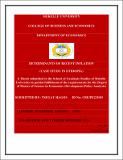| dc.description.abstract | Inflation refers to a situation in which the economy’s overall price level is rising. Therefore, one of the prime objectives of governments is achieving stable macroeconomic condition. This objective requires that prices be kept to a reasonably stable level. High and persistent inflation introduces uncertainties into the economy and may lead to slowdown of economic growth by discouraging domestic as well as foreign investments. It may also cause balance of payments problems by eroding a country’s competitive advantage. Moreover, because it hits the poor the most it needs to be tackled.
This study aims at understanding the forces behind the current inflationary process in Ethiopia. In order to achieve the stated objective a synthesis model of monetarist and cost-push inflation theories is estimated using vector autoregressive (VAR) models. The estimated models enable to understand the short run and the long run price dynamics in Ethiopia between 2001/02 and 2011/12.
The findings of the study suggest that the determinants of inflation differ between sectors (food and non-food inflation) and the time horizons under consideration. The most important forces behind food inflation in the long run are exchange rate, broad money supply, narrow money supply, food consumption price index, non-food consumption price index, interest rate, real GDP and nominal GDP. The long run determinants of non-food inflation, and also, are exchange rate, broad money supply, narrow money supply, food consumption price index, non-food consumption price index, interest rate, real GDP and nominal GDP are found to be prime sources of inflation.
To contain inflation, therefore, the government needs to exercise prudent fiscal and monetary policies. Inflation expectations need to be tackled by way of credible government policies to change public opinion. In this regard it is important to consider targeting of macroeconomic variables and adhere to announced targets. | en_GB |


